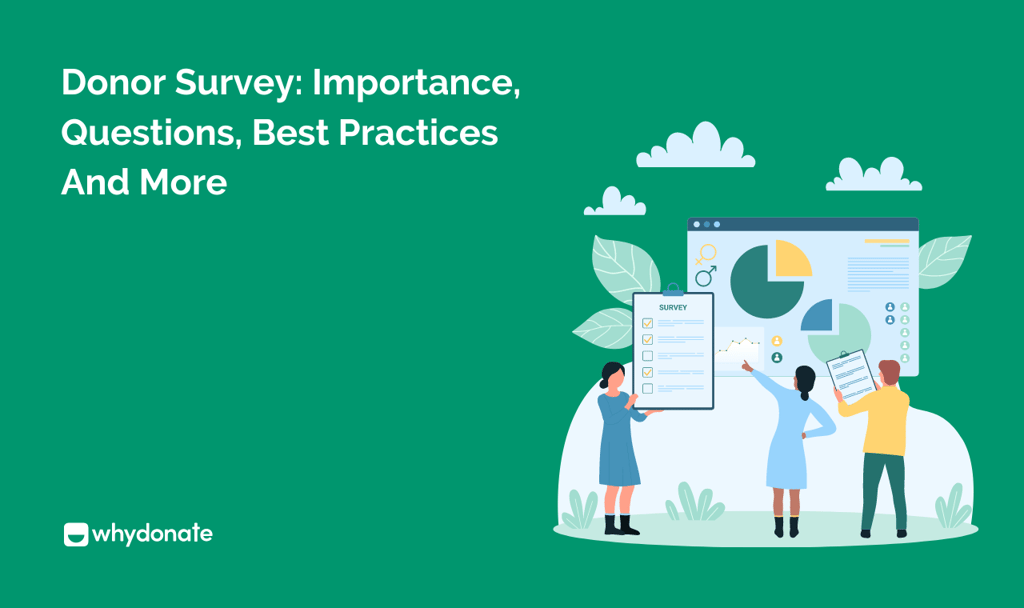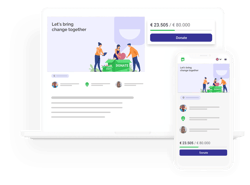Donors play a crucial role in the functioning of a non-profit organization. Their feedback can help in the betterment of your organisation. By sending out a donor survey, you can stop worrying about what can impress your donors and ask them directly.
After all, donors are also humans, and this activity will make them feel valued. By asking the right questions, you can build strong donor relationships and improve the performance of your non-profit organization.
- Explore The Power Of Donor Survey | Start An Online Fundraising Campaign For Free!
In this blog, we’ll read everything about a donor survey; from its significance to essential questions, we’ve covered it all and more. So make sure you stand by!
Table of Contents
What Is A Donor Survey?
A donor survey is a questionnaire for donors regarding their experience connecting with you and sharing insights on your overall performance. You can ask them specific questions to help improve the organisation, build better relationships, ask for suggestions, etc. It’s essential to identify which type of donor survey would work best for you (we’ve covered this in further detail in this blog).
However, having a good follow-up plan is equally essential as the donor feedback survey itself. If you don’t make the proper implementations after the survey or don’t reach out to them regarding their answers, this may lead to donor dissatisfaction. It might make them feel that their time was wasted or even feel devalued. This is why getting back to them after the donor survey is essential.
What Are The Types Of Donor Surveys?
Donor surveys come in various forms: a donor motivation survey, a donor satisfaction survey, and a donor stewardship/donor feedback survey. Identifying and creating an effective survey and utilizing its collected data by taking this path can maintain donor loyalty and avoid donor fatigue.
These are three primary types of surveys that may be conducted on donors:
- Donor Motivation Survey: To gain insights into why people give to your cause, create a donor motivation survey. It’ll help you know the reason why they feel connected to your cause.
- Donor Satisfaction Survey: Satisfaction surveys will prove useful if you wish to know donors’ personal experiences in connecting with you. The feedback obtained from this survey helps non-profits understand where they excel and where they might need to improve to ensure a positive donor experience.
- Donor Feedback Survey: Stewardship surveys offer another method for engaging your donors and building better bonds with them while furthering your cause. It can help you appreciate your donors, ask for their suggestions, and involve them in decision-making, basically aiming to strengthen your relationship.

Why Is Donor Survey Important?
Here are some of the significant reasons why a donor survey plays a crucial role:
1. Improving Donor Retention
Conducting a donor survey can improve donor retention as the donors will feel valued. It indicates that your organization cares about its supporters and stays in touch with them. This will make donors remain for long and support your initiatives. Since surveys contribute to more donor satisfaction, they automatically cater to better donor retention.
2. Maintaining Donor Relationships
Donors are not just clients; they actually care about the causes they support. Taking their suggestions, asking questions related to your initiatives, and involving them in decision-making make them appreciated. This leads to better donor relationships. It fosters a sense of partnership and makes them feel that the organization truly considers their opinions.
3. Asking For Suggestions
A donor survey can help you to take new suggestions from the donors themselves. As we mentioned earlier, donors are also human beings, and they would love to answer questions about the causes they care about. These suggestions can be constructive for your organization and allow you to introduce new tactics for the donors, by the donors!
4. Knowing Your Strong And Weak Points
By conducting a donor survey, you can identify your strengths and weaknesses directly from your supporters. This will give you an opportunity to take constructive feedback and work on it accordingly. It’s important to note that life is a continuous process of learning and improving. You can ask for your strong and weak points through these surveys.
5. Building Trust and Transparency
Sending out questionnaires and then reverting your opinions will create a sense of trust and transparency among the donor and your organization. A donor survey gives donors an opportunity to communicate with you regarding matters you don’t commonly talk about.
6. Measuring Impact
Surveys often include questions regarding donors’ perception of the impact of donations and create impact reports accordingly. This allows you to evaluate and communicate the effectiveness of your programs, building donor confidence that your initiative will bring positive change.

15 Most Important Donor Survey Questions
Now that we’ve covered almost everything about donor surveys, let’s unveil some of the vital donor survey questions:
Donor Motivation Survey:
- What initially attracted you to support our cause/organization?
- How strongly did you identify with its mission and values?
- Do your donations aim to have any specific impacts or changes?
- Did personal experiences or connections impact your decision to donate?
- Which aspects of our cause resonate most with you?
Donor Satisfaction Survey:
- Are you satisfied with your experience donating to our organization?
- Was our donation process easy to navigate, user-friendly, and effective in communicating our activities and impacts to each other?
- How are our activities progressing with measurable, impactful goals implied in real life?
- Were our activities meeting expectations, or were they falling short in reaching them?
- Are there specific things we could have done differently to provide an enjoyable donor experience?
Donor Feedback Survey:
- Please let us know your preferred methods of staying in the know (newsletters, email updates, or social media updates.)
- Have you considered volunteering or engaging more actively by engaging beyond financial contributions alone with us?
- What additional details would be beneficial regarding how your donation was utilized?
- Do you wish for us to take on specific events or initiatives in the near future, and are there any that are particularly meaningful to you?
- Would you recommend our organization, given your experiences?

Donor Survey Best Practices
Donor surveys provide non-profits and organizations with an effective means of collecting insights, feedback, and preferences directly from supporters. However, donor survey best practices must be observed when designing and administering these questionnaires for maximum participation and meaningful responses.
Here are a few things you should remember before going down this route:
- Clear Objectives: Before devising questions for your survey, establish clear objectives as to its purpose and goal. Is the goal to obtain feedback for an ongoing fundraising campaign, explore communication preferences, or simply collect insightful responses that lead to lasting solutions?
- Be Brief: Show donors some respect by keeping the survey brief and focused. Only ask essential questions that directly address goals. An engaging and shorter questionnaire can more quickly garner respondents while still maintaining high engagement throughout.
- Implement Different Question Types: For optimal donor engagement and insight-gathering purposes, try employing various question types like multiple choice questions with structured responses as well as open-ended inquiries that provide qualitative data insights.
- Keep It Straightforward: Use simple language when formulating survey questions so donors are easily understood by respondents instead of employing technical terms that may cause unnecessary confusion among your respondents.
- Anonymous Answers: Allow respondents to remain anonymous as it will promote more honest and open responses, especially on sensitive subjects where respondents might otherwise feel reluctant to express themselves directly. Doing this may encourage donors to provide honest answers more freely than would otherwise occur.
Implementation of these donor survey best practices enables organizations to conduct surveys more successfully for greater insight, deepened donor relationships, and support strategic decision-making processes.
Key Takeaways!
In a nutshell, a donor survey is a crucial activity that you must conduct at least twice a year to ensure smooth donor engagement. It not only fosters better relationships with your donors but provides a scope for improvement. By asking for suggestions and feedback directly from your donors, your non-profit can introduce new methods and tactics to conduct your standard activities.
If you wish to raise money and get access to several excellent features without paying extra money, start your fundraiser on WhyDonate today! Leverage our robust donor network and get in touch with supporters worldwide. Start today!
FAQs (Frequently Asked Questions)
How do you collect donor data?
You can collect donor data through online forms, CRM systems, donation platforms, and surveys. These methods have been used for ages and have proven to be efficient when it comes to collecting donor data.
What are the three types of donors?
Although there are many types of donors, the three primary types of donors are:
- Individual Donors
- Major Donors
- Recurring Donors
What is donor process?
Attracting, interacting, recognizing, and keeping donors are all included in the donor process.


















